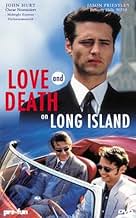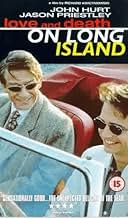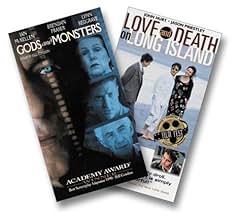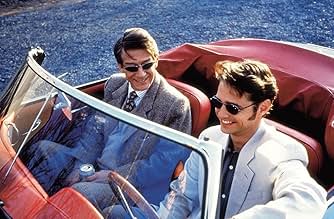Ajouter une intrigue dans votre langueGiles De'Ath (Sir John Hurt) is a widower who doesn't like anything modern. He goes to movies and falls in love with movie star Ronnie Bostock (Jason Priestly). He then investigates everythi... Tout lireGiles De'Ath (Sir John Hurt) is a widower who doesn't like anything modern. He goes to movies and falls in love with movie star Ronnie Bostock (Jason Priestly). He then investigates everything about the movie and Ronnie. After that, he travels to Long Island City, where Ronnie li... Tout lireGiles De'Ath (Sir John Hurt) is a widower who doesn't like anything modern. He goes to movies and falls in love with movie star Ronnie Bostock (Jason Priestly). He then investigates everything about the movie and Ronnie. After that, he travels to Long Island City, where Ronnie lives, and meets him, pretending that Ronnie is a great actor, and that's why Giles admires ... Tout lire
- Réalisation
- Scénario
- Casting principal
- Victoire aux 1 BAFTA Award
- 4 victoires et 4 nominations au total
- Video Assistant
- (as Daniel Webb)
- Rob
- (as Dean Gariss)
Avis à la une
Hurt plays Giles De'Ath, a most formal English author who, as a radio interviewer puts it, doesn't have much use for the 20th century. He would have even less use for a movie named 'Hotpants College II,' except that when he accidentally happens to view it, he's struck like a thunderbolt by the vision of an actor on the screen, Ronnie Bostock, played by Jason Priestly. From that moment on, De'Ath comes to life in his obsession for the young man and his elaborate plans to meet him. Having been taken care of by a housekeeper these many years, De'Ath struggles with the most ordinary tasks as he lives out his obsession. He buys teenage girls' magazines at the newsstand and furtively disposes of them lest anyone find out his secret. He purchases a videocassette recorder to watch Ronnie's films, not realizing that a television is also necessary for their viewing. Then when he goes to Bostock's home town on Long Island in hopes of tracking him down, he's almost like The Man Who Fell to Earth, being alone in such an alien culture. His behavior is as obsessive as any stalker, but he must be the most genteel stalker there ever was.
Watching Hurt go through this routine during the movie's first half is so fascinating and so entertaining that the film actually hits a bit of a stall when he finally does meets the object of his desire, but it rights itself quickly and comes to a nice conclusion. Some might hope for a more wildly dramatic ending, but I was satisfied.
Jason Priestly does a fine job here in what is basically a thankless role, in that by this film's nature, he's constantly upstaged by Hurt's performance, like Othello is by Iago, or Nick Nolte was by Eddie Murphy in '48 HRS.,' if that's not too jolting of a comparison. I found it fascinating, what some might call a "little" film except that it displays some large talents.
That's what an imaginary Sight and Sound review gives the trashy teenage exploitation film Hotpants College 2. However, for "erstwhile fogey" and famous English writer Giles De'Ath (John Hurt) this Porky-esque flick, which he watches purely by accident (he meant to see an E.M Forster adaptation) has one very redeeming grace. It contains the love of Giles' life Ronnie Bostock (Jason Priestley).
This witty and poignant film, which divides itself between London and Long Island, may have faltered badly if it had been left in lesser hands than John Hurt. However, Hurt is simply mesmerising. He is one of the few actors who never shies away from making the audience utterly ill at ease watch 1984, the monster shooting out of his stomach in Alien or The Elephant Man for confirmation.
Self-exiled from the modern world in his stuffy flat, with a picture of his recently deceased wife by his writing desk, and a fussy maid (Sheila Hancock) tending to his every whim, Giles' emotions are thoroughly repressed. Until, that is, fate lends a hand and exposes Giles to, amongst other things, terrible American teenage movies, video stores, fax machines, One Man and His Dog, and, finally, to his own sexual desires.
Love and Death in Long Island is brimming with quirky cameos, including weirdo diner owner Irv (Maury Chaykin), a motel manager (Elizabeth Quinn) reminiscent of Shelley Winters in Lolita, and a surprisingly good Priestley (lampooning his "bimbo" soap background much like Maxwell Caulfield in The Real Blonde).
However, it is ultimately a "warts and all" performance from Hurt that holds our gaze. Dignified, perplexed and slightly tragic, Hurt makes Giles one of the most touching "stalkers" in film history. Much like James Mason's Humbert in Lolita, Giles is a man of culture finding beauty in youth, in coarseness - in "all that I myself have never been."
Ultimately, a slow, witty work with one outstanding feature.
He becomes besotted with the image of a handsome young actor Ronnie Bostock (Jason Priestley) a favourite among teen-age movie-goers. It's as if he is starting a completely new life with a new warmth he has never known before.
The urge to help Ronnie in his career so that he will always be close to him is the predominant theme of the film. John Hurt's performance as the older man restraining his true feelings for a handsome young man of another generation is faultless and truly absorbing. Conversations between the two men are the highlights of the film and the confession scene extremely moving.
Ronnie Bostock's girl friend Audrey ( Fiona Loewi) is both charming and beautiful and adds a sweet touch to the story. She is responsible for bringing the writer and actor together. The story is punctuated with little episodes of wry humour brought about by people who live entirely different lives.
Altogether a very satisfying film that shows how some of us live in a cocoon unaware of the extreme joy and subsequent disappointment that lies beyond.
John Hurt, once a creepy Caligula in the 1970's TV version of "I, Claudius" and later the protagonist in "The Elephant Man" does a perfect Giles with wild emotion just in check beneath the old fogey exterior. He looks and acts very much the same as another great English actor, Michael Gough did as Ruskin, another literary panjandrum barely able to contain himself. I was also reminded of the late Sir Kingsley Amis, an angry young man and an engaging writer in his day who became a rather sorry figure in old age, bereft of his talent and full of spleen and booze. Giles, though, is much more controlled. Jason Priestley of "Beverley Hills 90210" is also perfectly cast, though he doesn't have to do more than be Brandon, the nice all-American male bimbo. As Ronnies' girlfriend Audrey, Fiona Loewi does a subtle job. Initially appearing to be no brighter than Ronnie, Audrey reads the situation much more quickly than he does. Or at least her turf protection instincts are pretty acute. There are nicely observed minor roles from Sheila Hancock as Giles's housekeeper, Elizabeth Quinn as a motel proprietor and Maury Chaykin as Irv, chef at the local Diner.
Locationwise, this film is a bit of a fraud. Having promised us Long Island in the title (and storyline), the producers gave us Halifax, Nova Scotia instead, in return apparently for a bit of government film corporation money. Well, it looks the same as Long Island, but if I were the Nova Scotia film corp. people I'd feel a bit foolish. What's the point in using public money to promote your local landscape and character when people think its somewhere else? It's true most films can be made anywhere (look what comes out of Fox in Sydney) but in some films the geography is crucial. I just hope they don't make "Shipping News" in Long Island instead of Newfoundland.
"I WRITE. I do not PROCESS words."
Giles De'Ath is a frail man on the verge of suffocating on high 19th century culture: he is sheltered within cafes, cigars, E.M. Forster, and presentations of lectures like "The Death of the Future." As one radio commentator asks him, "Does the 20th century play ANY part in your life?"
Giles is utterly changed by witnessing truly LOW culture on the big screen, the film Hotpants College II that he mistakes for E.M. Forster's Eternal Moment. Upon going for a second viewing, Giles is ashamed of even saying the name of the movie at first. He is mesmerized by the image of one Ronnie Bostock, Mikey in the film, a waiter who gets pushed around and finally shoved onto a restaurant counter and covered with ketchup, making Mikey a Christlike martyr for the Porky's generation. When the movie fades to black and the end credits come up, the name RONNIE BOSTOCK literally shines through the eyes of Giles De'Ath. So begins Giles' reluctant but determined search for this Bostock. He's seen all Ronnie's films and is transfixed by his image (indeed, Ronnie's movies are the first thing he's ever seen on a TV or a film screen.)
The second act of the movie takes Mr. De'Ath to Chesterton, Long Island- the home of Ronnie Bostock. De'Ath learns little by little about the modern American culture as he amusingly stalks his way into Ronnie's home. He offers his devotion to the career of Ronnie Bostock, who has decided he wants to be taken seriously as an actor.
Giles introduces him to an idea for a movie: a deaf-mute who has never been outside in the real world, who in fantasy is surrounded only by white, empty space, has in his possession a television to look outwards. After enough images, this childlike deaf-mute wants to experience the real world and must do it through fulfilling the quest of falling in love.
Bostock loves the idea, but he just doesn't GET it about Giles. That's DE'ATH's story. (It's strange when seeing the vision of Priestley in that script. I found myself wondering the effect of Teletubbies upon children, who may be both deaf and mute in certain ways and learn how to reach out towards reality through surreal television images. It's both troubling and poignant...)
Giles De'Ath is in love with the image of Ronnie Bostock: regardless of how low his movies are, Ronnie has a "file of smiles" for different emotions, "a permanence" in his look. His martyred state on the counter resembles old paintings. His film work is what Shakespeare would have done as both his comedies and Hotpants College 2 were made "for the rabble in the pit."
However, Giles, somewhere along the way, realizes that he is ALSO "completely, desperately" in love with Ronnie Bostock.
I won't give away the ending. The film is low-budget, short, and it has basically only two developed characters. It doesn't have much of an effect afterwards, but it has real poetry to it, especially in Hurt's transformation from high culture shelter to low culture inspiration. I'm still not sure if this is a high-culture indie making fun of low culture, or a low culture movie trying to justify itself, as Giles tries to do for Ronnie. One reason I hated Boogie Nights, among many, is that it wanted us to sympathize with Mark Wahlberg's porn star but also allowed us to distance ourselves from him and laugh AT him anytime we wanted: that's cheating. This film gets it right- it's not sarcastic about Ronnie's work, though certainly we have reasons to laugh at it. We have to draw our own conclusions about these characters, about the LOVE we see that Giles has for the star. Is this REAL love, or is it even more than that?
I'm a lover of film, and there are images that I see that I will pause, and play in slow motion, especially now with quicktime clips on the Mac: the poetry of a certain face, like that of Jodhi May(Alice) in Last of the Mohicans right before she jumps off the cliff. There's a love there for her, for her image, that is indescribable for me, so I can appreciate and truly relish the story of a man enamored by an image.
I'm also always glad to see a film about a man who finds inspiration in modernity. We know by the end that Giles is entering a new kind of life: perhaps "The De'Ath of the Future" is somebody who accepts all culture. He sees the low in the high and the high in the low, and he makes no distinction between the "art" of images in the art gallery and those of your everyday teen flick.
Le saviez-vous
- AnecdotesJohn Hurt said multiple times that he felt that this film represented his best work on film.
- GaffesWhen the mailman delivers mail to Ronnie Bostock's mailbox,he raises the mailbox flag, presumably to signal to the resident that mail has been delivered. (Ronnie's girlfriend, seeing the mailbox flag has been raised, seems to interpret the signal accordingly.) Although it may be the convention for mail delivery wherever the director/writer is from, it is not the case on Long Island, where it is the custom for the resident to raise the mailbox flag to alert the mailman that mail is in the mailbox waiting to be picked up. Once the mail has been picked up, the mailman lowers the flag - the opposite of what occurred in the film.
- Citations
Taxi Driver: The sign says "no smoking."
Giles De'Ath: No, the sign says "thank you for not smoking." As I am smoking, I don't expect to be thanked.
Meilleurs choix
- How long is Love and Death on Long Island?Alimenté par Alexa
Détails
Box-office
- Montant brut aux États-Unis et au Canada
- 2 581 012 $US
- Week-end de sortie aux États-Unis et au Canada
- 78 151 $US
- 8 mars 1998
- Montant brut mondial
- 2 581 012 $US
- Durée1 heure 33 minutes
- Couleur
- Mixage
- Rapport de forme
- 1.85 : 1
Contribuer à cette page



















